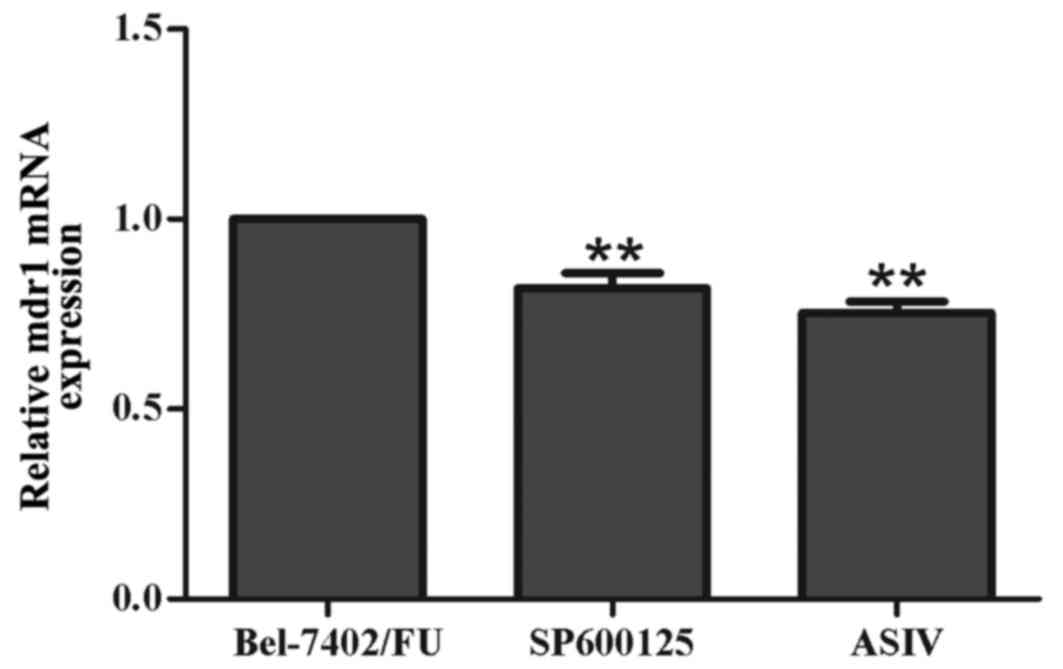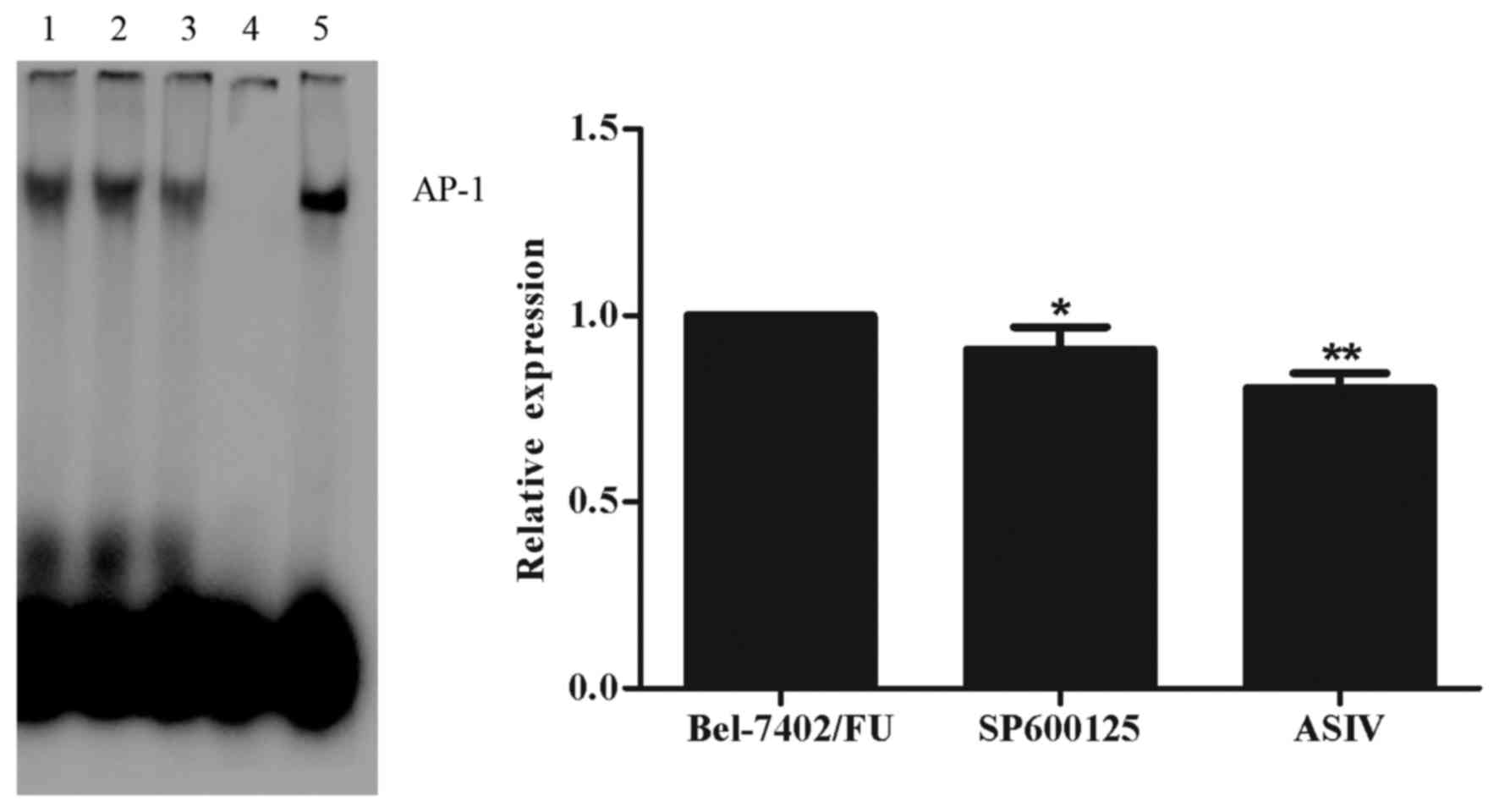|
1
|
Aouali N, Eddabra L, Macadré J and Morjani
H: Immunosuppressors and reversion of multidrug-resistance. Crit
Rev OncolHematol. 56:61–70. 2005. View Article : Google Scholar
|
|
2
|
Chen CY, Liu NY, Lin HC, Lee CY, Hung CC
and Chang CS: Synthesis and bioevaluation of novel benzodipyranone
derivatives as P-glycoprotein inhibitors for multidrug resistance
reversal agents. Eur J med Chem. 118:219–229. 2016. View Article : Google Scholar : PubMed/NCBI
|
|
3
|
Safa AR: Identification and
characterization of the binding sites of P-glycoprotein for
multidrug resistance-related drugs and modulators. Curr Med Chem
Anti Cancer Agents. 4:1–17. 2004. View Article : Google Scholar : PubMed/NCBI
|
|
4
|
Yuan WQ, Zhang RR, Wang J, Ma Y, Li WX,
Jing RW and Cai SH: Asclepiasterol, a novel C21 steroidal glycoside
derived from Asclepias curassavica, reverses tumor multidrug
resistance by downregulating P-glycoprotein expression. Oncotarget.
7:31466–31483. 2016. View Article : Google Scholar : PubMed/NCBI
|
|
5
|
Mohseni M, Samadi N, Ghanbari P, Yousefi
B, Tabasinezhad M, Sharifi S and Nazemiyeh H: Co-treatment by
docetaxel and vinblastine breaks down P-glycoprotein mediated
chemo-resistance. Iran J Basic Med Sci. 19:300–309. 2016.PubMed/NCBI
|
|
6
|
Song JZ, Yiu HH, Qiao CF, Han QB and Xu
Hx: Chemical comparison and classification of Radix Astragali by
determination of isoflavonoids and astragalosides. J Pharm Biomed
Anal. 47:399–406. 2008. View Article : Google Scholar : PubMed/NCBI
|
|
7
|
Wang PP, Xu DJ, Huang C, Wang WP and Xu
WK: Astragaloside IV reduces the expression level of P-glycoprotein
in multidrug-resistant human hepatic cancer cell lines. Mol Med
Rep. 9:2131–2137. 2014.PubMed/NCBI
|
|
8
|
Osborn MT and Chambers TC: Role of the
stress-activated/c-Jun NH2-terminal protein kinase pathway in the
cellular response to adriamycin and other chemotherapeutic drugs. J
Biol Chem. 271:30950–30955. 1996. View Article : Google Scholar : PubMed/NCBI
|
|
9
|
Han L, Wang Y, Guo X, Zhou Y, Zhang J,
Wang N, Jiang J, Ma F and Wang Q: Downregulation of MDR1 gene by
cepharanthine hydrochloride is related to the activation of
c-Jun/JNK in K562/ADR cells. Biomed Res Int. 2014:1643912014.
View Article : Google Scholar : PubMed/NCBI
|
|
10
|
Zhu MM, Tong JL, Xu Q, Nie F, Xu XT, Xiao
SD and Ran ZH: Increased JNK1 signaling pathway is responsible for
ABCG2-mediated multidrug resistance in human colon cancer. PLoS
One. 7:e417632012. View Article : Google Scholar : PubMed/NCBI
|
|
11
|
Manov I, Bashenko Y, Eliaz-Wolkowicz A,
Mizrahi M, Liran O and Iancu TC: High-dose acetaminophen inhibits
the lethal effect of doxorubicin in HepG2 cells: The role of
P-glycoprotein and mitogen-activated protein kinase p44/42 pathway.
J Pharmacol Exp Ther. 322:1013–1022. 2007. View Article : Google Scholar : PubMed/NCBI
|
|
12
|
Shinoda C, Maruyama M, Fujishita T, Dohkan
J, Oda H, Shinoda K, Yamada T, Miyabayashi K, Hayashi R, Kawagishi
Y, et al: Doxorubicin induces expression of multidrug
resistance-associated protein 1 in human small cell lung cancer
cell lines by the c-jun N-terminal kinase pathway. Int J Cancer.
117:21–31. 2005. View Article : Google Scholar : PubMed/NCBI
|
|
13
|
Liu XY, Liu SP, Jiang J, Zhang X and Zhang
T: Inhibition of the JNK signaling pathway increases sensitivity of
hepatocellular carcinoma cells to cisplatin by down-regulating
expression of P-glycoprotein. Eur Rev Med Pharmacol Sci.
20:1098–1108. 2016.PubMed/NCBI
|
|
14
|
Huang C, Xu DJ, Xia Q, Wang P, Rong C and
Su Y: Reversal of P-glycoprotein-mediated multidrug resistance of
human hepatic cancer cells by astragaloside II. J Pharm Pharmacol.
64:1741–1750. 2012. View Article : Google Scholar : PubMed/NCBI
|
|
15
|
Livak KJ and Schmittgen TD: Analysis of
relative gene expression data using real-time quantitative PCR and
the 2(−Delta Delta C(T)) method. Methods. 25:402–408. 2001.
View Article : Google Scholar : PubMed/NCBI
|
|
16
|
Galluzzi L, Vitale I, Michels J, Brenner
C, Szabadkai G, Harel-bellan A, Castedo M and Kroemer G: Systems
biology of cisplatin resistance: Past, present, and future. Cell
Death Dis. 5:e12572014. View Article : Google Scholar : PubMed/NCBI
|
|
17
|
Gottesman MM, Fojo T and Bates SE:
Multidrug resistance in cancer: Role of ATP-dependent transporters.
Nat Rev Cancer. 2:48–58. 2002. View
Article : Google Scholar : PubMed/NCBI
|
|
18
|
Zhou J, Liu M, Aneja R, Chandra R, Lage H
and Joshi HC: Reversal of P-glycoprotein-mediated multidrug
resistance in cancer cells by the c-Jun NH2-terminal
kinase. Cancer Res. 66:445–452. 2016. View Article : Google Scholar
|
|
19
|
Liu M, Li D, Aneja R, Joshi HC, Xie S,
Zhang C and Zhou J: PO2-dependent differential
regulation of multidrug resistance 1 gene expression by the c-Jun
NH2-terminal kinase pathway. J BiolChem. 282:17581–64.
2007.
|
|
20
|
Bark H and Choi CH: PSC833, cyclosporine
analogue, downregulates MDR1 expression by activating
JNK/c-Jun/AP-1 and suppressing NF-kappaB. Cancer Chemother
Pharmacol. 65:1131–1136. 2010. View Article : Google Scholar : PubMed/NCBI
|
|
21
|
Eferl R and Wagner EF: AP-1: A
double-edged sword in tumorigenesis. Nat Rev Cancer. 3:859–868.
2003. View
Article : Google Scholar : PubMed/NCBI
|
|
22
|
Shaulian E and Karin M: AP-1 as a
regulator of cell life and death. Nat Cell Biol. 4:E131–E136. 2002.
View Article : Google Scholar : PubMed/NCBI
|
|
23
|
Daschner PJ, Ciolino HP, Plouzek CA and
Yeh GC: Increased AP-1 activity in drug resistant human breast
cancer MCF-7 cells. Breast Cancer Res Treat. 53:229–240. 1999.
View Article : Google Scholar : PubMed/NCBI
|


















